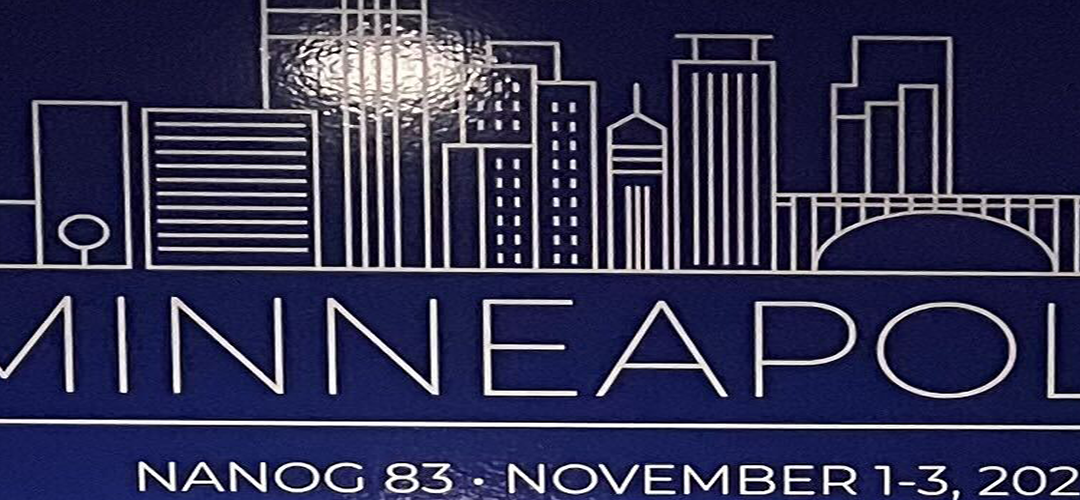NANOG 83 wrapped this week—the first attempt at an in-person/hybrid conference since COVID-19 began—and we were thrilled to attend.
While we’ll be posting a more in-depth review in the coming days, one presentation in particular left me pondering the role of the network operator in modern times: Who Controls the Internet? And should they? by Bert Hubert, the founder of PowerDNS.
As I’ve written before, some of the key strengths of NANOG and similar technical bodies (e.g., IETF/ICANN/FSF, etc.) are the friendly cooperation and ‘co-opetition’ between technical engineers and developers and the free exchange of ideas and information that make this so important.
Today, we may be seen as dinosaurs by younger technology-enabled generations who have never known a life without phones, social media, or instant access to everything technology has to offer. However, none of us are immune to the current climate; governments, regulation and even large corporations harness the power of technology and significantly impact our everyday lives.
As the proverb goes, with great power comes great responsibility, and that has never been truer.
There are no easy answers, but I think that for those of us who have been involved in building the foundation and fabric of the information superhighway (a term that younger generations may not be familiar with), it is valuable to look back and consider the last 50 years.
As a participating member of ICANN, we’ve had the privilege of engaging with stakeholders around the world who share a common purpose. Every time we attend, I’m struck by what has been accomplished: the internet has lifted billions of people out of poverty by enabling education, commerce, and the free flow of information, and has transformed our world at a pace greater than any in history. And that pace continues to accelerate.
As open-source developers and proponents of Open Source, we’ve closely observed the impact of free software on our world, and how that impact has been amplified by the global internet. Of even greater significance is how the tenets of the open-source community have propelled us to our current reality, and so, we must ask ourselves: What exactly is the philosophy behind free software?
There are four essential freedoms, which act as very powerful cornerstones:
- The freedom to run the program as you wish, for any purpose (freedom 0).
- The freedom to study how the program works and change it so it does your computing as you wish (freedom 1). Access to the source code is a precondition for this.
- The freedom to redistribute copies so you can help others (freedom 2).
- The freedom to distribute copies of your modified versions to others (freedom 3). By doing this you can give the whole community a chance to benefit from your changes. Access to the source code is a precondition for this.
For younger generations embarking on their journeys in the contemporary world, it can be easy to overlook that the technology-centric environment we live in today was made possible by the very ideals of connecting, enabling and empowering both the world and its people.
Of course, as is the case with all creations and discoveries, we can categorize the impacts of these impressive developments in terms of a positive—negative dichotomy and understand the potential drawbacks as well as the benefits.
Beyond the freeway of information that exists without tollways and barricades, we’ve brought to life a world where voices are amplified, political discourse feels frayed and divisive and it is easy to judge, dismiss or even destroy others with a simple click or tweet. It has never been easier to censor and cancel. It’s so simple to express personal opinions without thought as to how they affect others or have the potential to change someone’s life course (or even the world).
Indeed, with great power does come great responsibility.
So, what is our role as a network operator?
I believe that the information superhighway is analogous to an actual freeway. I say this because, as the constructors of the information superhighway, we aren’t building it for a car or truck of a specific color, size, shape, or legacy.
That doesn’t mean we don’t have personal opinions. That doesn’t mean there aren’t laws and standards we adhere to.
However, it does mean that we must be able to facilitate the open exchange of information, regardless of what we think, and this is applicable now more than ever.
Because of this, our role as a network operator is especially important.
By the very fact you’re able to read this on the screen of your internet-enabled device, my point has already been proven.
Mark Mahle
CEO, NetActuate
